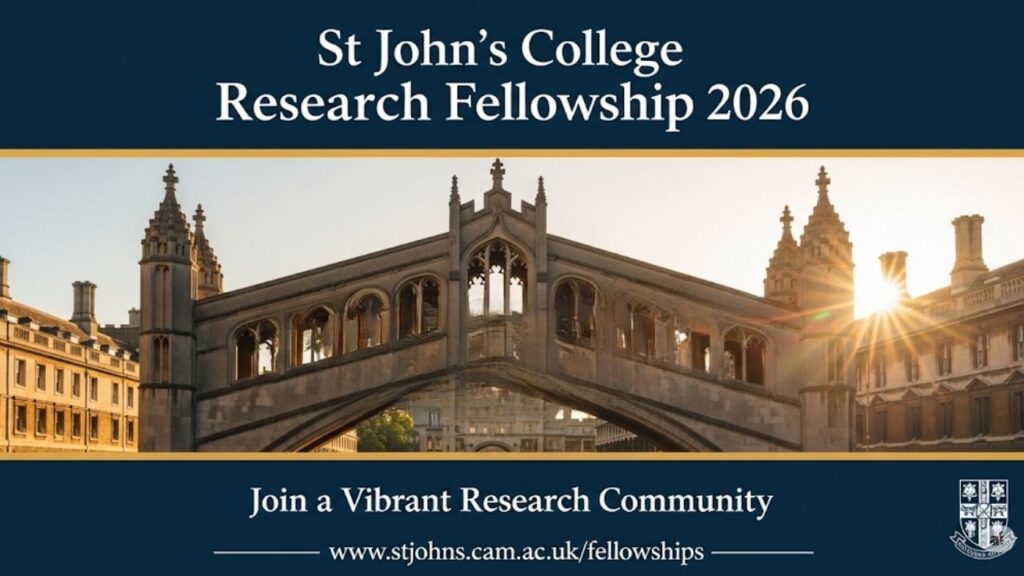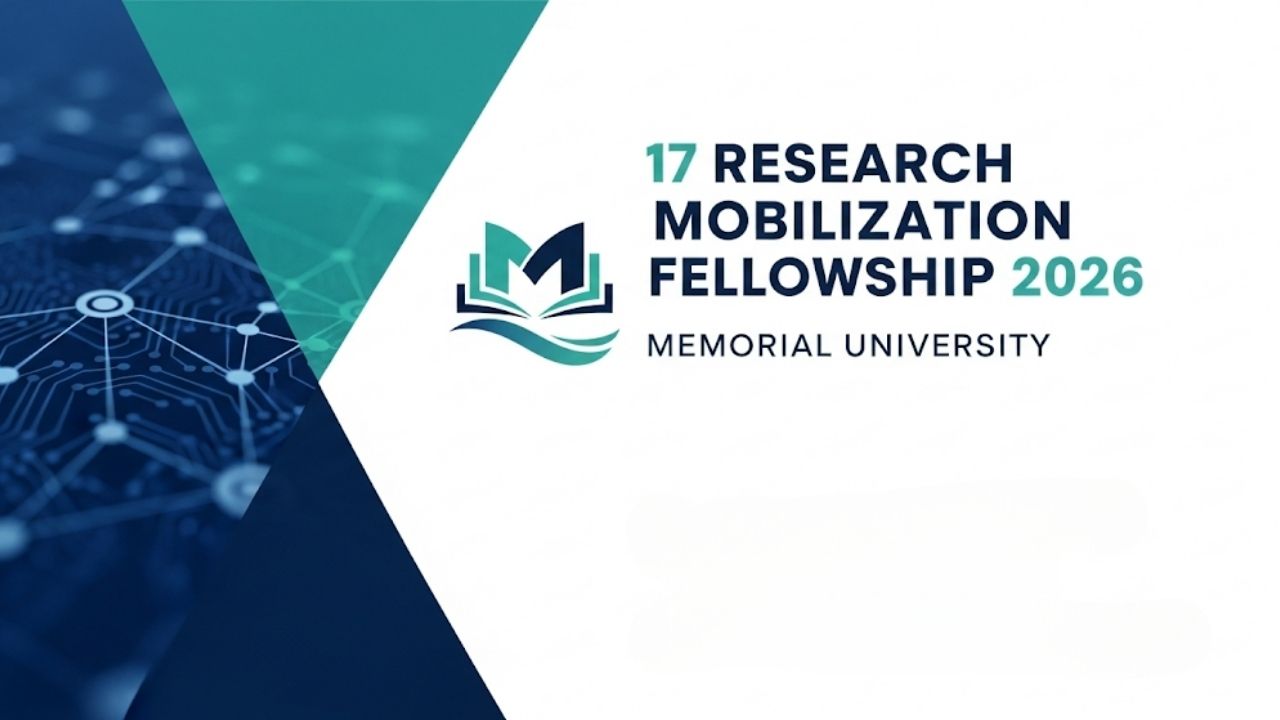The St John’s College Research Fellowship 2026 represents one of the most prestigious early-career academic appointments in the world. For aspiring postdoctoral researchers, securing a Junior Research Fellowship (JRF) at Cambridge is a life-changing achievement, offering unparalleled freedom to pursue your own research in a historic and intellectually vibrant setting. This guide provides a clear, step-by-step roadmap to navigate the application process, helping you transform your ambition into a compelling and successful application.

St John’s College Research Fellowship 2026
| Key Feature | Detail (Based on the 2025 Competition) |
| Fellowship Stipend | Approximately £32,532 per annum (stipend is pensionable) |
| Key Eligibility | Applicants should have recently completed or be about to complete a PhD. |
| Application Window | Typically opens in late Summer/early Autumn 2025 for the 2026 intake. |
| Duration | Fixed term of three to four years. |
The St John’s College Research Fellowship 2026 is undoubtedly one of the most competitive postdoctoral fellowships in the UK. The standards are exceptionally high, but don’t let the prestige intimidate you. The committee is looking for one thing above all: brilliant, original thinkers with the potential to become leaders in their fields.St John’s College Website.
What Makes the St John’s JRF a Life-Changing Opportunity?
A Junior Research Fellowship isn’t just a job; it’s an invitation to join a community of scholars that has shaped the world for over 500 years. St John’s College, founded in 1511, boasts an incredible legacy, including numerous Nobel laureates, Prime Ministers, and literary giants.
As a Junior Research Fellow (JRF), you are given the most precious resources an academic can ask for: time and freedom. You are not bound by specific teaching loads or a senior academic’s research agenda. Your sole focus is to develop and execute your own groundbreaking research project.
Beyond the research, the fellowship includes:
- Full Membership: You become a Fellow of the College, with access to all its facilities.
- Community: You’ll dine at High Table, engaging in conversations with leading minds from every conceivable discipline.
- Generous Support: The role includes a competitive stipend, free accommodation in college or a housing allowance, and a budget for research expenses.
Are You Eligible for the St John’s College Research Fellowship 2026?
Eligibility is the first and most critical hurdle. The criteria are strict, so read them carefully on the official website when they are released. Based on previous years, here’s what you can generally expect.
Core Academic Requirements
- PhD Status: Typically, you must have completed all requirements for your PhD (including the viva voce examination) by the time the fellowship starts (usually 1st October 2026).
- Recency: There is often a window for when your PhD must have been awarded. For instance, you might not be eligible if you were awarded your PhD before a certain date (e.g., before late 2022 for the 2026 competition). This is to ensure the fellowship supports early-career researchers.
- No Salaried Post: Candidates who have held a permanent, salaried university teaching or research post are usually not eligible.
Subject Area Competitions
St John’s College typically runs two separate competitions each year, ensuring a balance between disciplines:
- Humanities and Social Sciences: Covering fields like history, literature, philosophy, law, economics, and politics.
- Sciences: Encompassing natural sciences, mathematics, engineering, and medical sciences.

Your Step-by-Step Guide: How to Apply for the JRF Cambridge
The application process is rigorous and multi-staged. It requires careful planning, starting months before the deadline. Here’s a breakdown of the journey.
Stage 1: The Initial Online Application (Anticipated Deadline: Autumn 2025)
The first step is submitting your application through the college’s online portal. This typically requires:
- A Detailed CV: Highlight your academic achievements, publications, conference presentations, and any awards.
- A List of Publications: If applicable.
- A Research Proposal: A statement of your proposed research, usually around 2,000 words.
- Names of Referees: You will need to provide contact information for two or three academic referees who can speak to your abilities and research potential.
Crafting a Winning Research Proposal
This is the heart of your application. Your proposal must be ambitious, original, and viable within the fellowship’s timeframe. In my experience advising applicants, the most common mistake is assuming the selection committee are all specialists in your niche field. They are not. Your proposal must be crystal clear to a broad academic audience.
- Be Bold, Yet Realistic: Propose a project that pushes the boundaries of your field but can be realistically completed in three to four years.
- Structure it Clearly: Use headings to outline your research questions, methodology, theoretical framework, and anticipated outcomes.
- Explain the ‘Why’: Why is this research important? Why does it need to be done now? And why are you the perfect person to do it?
Securing Powerful References
Choose your referees wisely. They should be senior academics who know you and your work intimately. Give them plenty of notice—at least a month—and provide them with your CV and research proposal so they can write a specific, detailed letter that strongly supports your case.
The Shortlisting Process: From Longlist to Final Interview
After the initial submission deadline, the selection committee begins its work.
The Longlist: Submitting a Piece of Written Work
If you make it to the longlist (usually notified in late autumn), you will be asked to submit a substantial piece of your written work. This is often a chapter from your dissertation or a published, peer-reviewed article.
Choose a piece that:
- Showcases your best, most original research.
- Demonstrates your analytical skills and clarity of argument.
- Aligns with the research you proposed in your application.
The Final Interview
A small number of candidates will be invited to an interview at St John’s College. This is the final stage. The interview is conducted by the Fellowship Committee, a group of Fellows from across the College’s disciplines.
You will typically be asked to give a short (10-15 minute) presentation on your research, followed by a Q&A session. Prepare to defend your work, explain its significance to non-specialists, and demonstrate your passion and intellectual curiosity. It’s as much a test of your ability to communicate and engage as it is of your research itself.

Life as a Junior Research Fellow
Securing a JRF at St John’s is the beginning of an incredible chapter. You’ll join a vibrant Middle Combination Room (MCR) of graduate students and other JRFs, as well as the Senior Combination Room (SCR) of established Fellows. The intellectual and social opportunities are immense, from formal dinners and research colloquia to punting on the River Cam.
EHRI ERIC Conny Kristel Fellowships 2025: Your Guide to a Life-Changing Research Opportunity
A Guide to the Leverhulme Early Career Fellowship 2026 at Cambridge
FAQs
Q1:When will the 2026 St John’s Research Fellowship application open?
Based on previous years, the application portal is expected to open in late summer or early autumn of 2025. Please monitor the official St John’s College fellowships page for the official announcement.
Q2:Can international students apply for the JRF?
Yes, applications are welcomed from candidates of any nationality. The fellowship is a globally recognized and sought-after position.
Q3:What is the current stipend for the St John’s JRF?
For the 2025 competition, the stipend was set at £32,532 per annum and is pensionable under the Universities Superannuation Scheme (USS). This figure is subject to review for the 2026 competition. Fellows also receive significant non-financial benefits like housing and dining rights.
Q4:Is there an age limit for applying?
There is no official age limit. However, the eligibility criteria related to the date of your PhD award are designed to ensure the fellowship supports researchers in the early stages of their academic careers.










